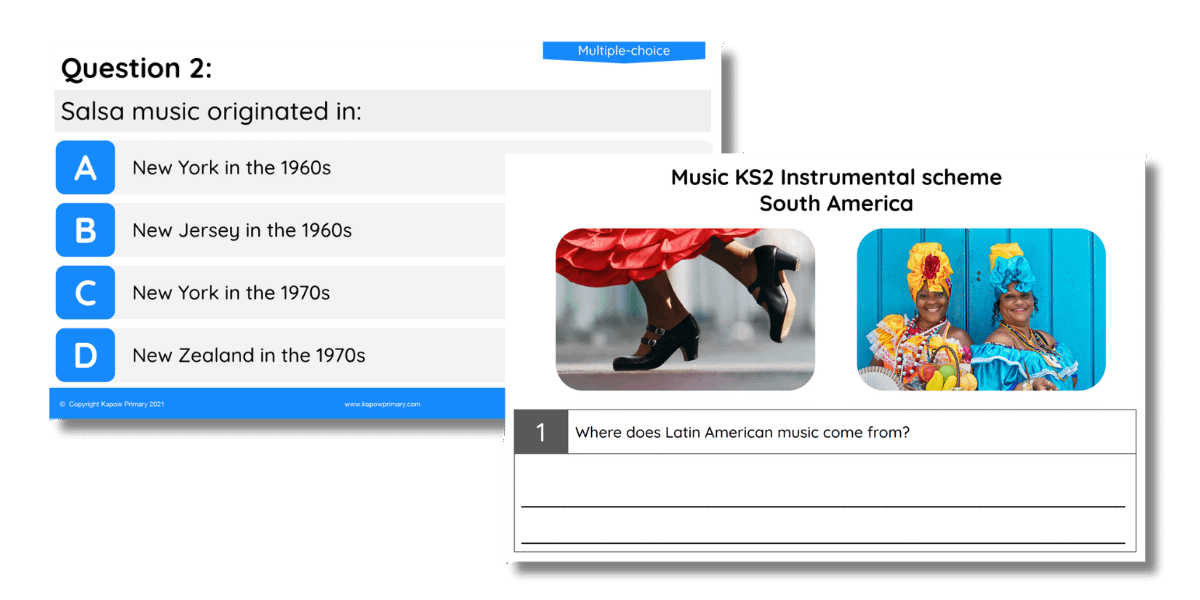How To Lead Music With Confidence, Even If You’re Not A Specialist
Written by Kapow Primary
Published on 21st December 2023
Last Updated: 11th November 2024
Written by Kapow Primary
Published on 21st December 2023
Last Updated: 11th November 2024

If there’s one thing we hear again and again when talking to primary teachers, it’s ‘I’m not musical – so I can’t teach Music.’
It’s completely understandable to feel nervous about teaching primary Music if it wasn’t your thing when you were at school; however, this doesn’t mean you’re ‘not musical’! Every single human on the planet is ‘musical’ – it’s just that some of us haven’t tapped into it yet, and it’s never too late to start.
Of course, if you’re one of those people who hasn’t actively been involved in music-making before, then taking on the subject leader role for primary Music can feel ten times as daunting as just having to teach it to your own class.
If it’s true that as a teacher, you only need to be one step ahead of the children, then as a subject leader, you only need to be one step ahead of the other teachers!
Firstly, make sure that you’re familiar with the national curriculum for Music, as this is the statutory guidance that you need to follow in school.
Secondly, you’ll want to familiarise yourself with the latest non-statutory guidance, such as:
From this, you’ll get a picture of the approaches the DfE and Ofsted are promoting when it comes to music in schools.
You can use our Kapow Primary national curriculum coverage document and to see how our primary Music curriculum relates to the above statutory and non-statutory advice.
Your local Music hub will also be a great source of advice and support for you, so you should definitely get in touch with them to see what they can offer. You might also like to join some of the music teacher groups on Facebook and follow the #MusicEd hashtag on X (formerly Twitter) to access a support network of colleagues across the UK and beyond.
Like all the other subjects of the primary curriculum, Music is intended to be taught and led by generalists, not specialists. Obviously, if you do have a musical background, then you’re going to have an advantage, but with a little bit of support and guidance, everything in the national curriculum can be achieved by generalist teachers.
If you feel that your musical knowledge could do with a bit of a boost, then Kapow Primary has a series of key skill videos and resources through which you can learn about important musical concepts such as:
Once you start to use Kapow’s Music lesson plans (available in our main scheme as well as our Instrumental scheme), you’ll have access to a variety of videos that will help to increase your knowledge and support you in teaching Music. Over time, you’ll continue to develop your confidence, skills, and expertise in Music.
You might consider learning to play an instrument or having some singing lessons if this would make you feel more ‘musical’.
If you’ve chosen to use the Kapow Primary Music curriculum, then you’re already well on the way to developing your colleagues’ confidence in Music, as this is what our approach is all about.
As well as directing colleagues to the videos of Music teaching tips that support each Music lesson plan, you might want to provide more targeted support by using our teacher knowledge audit document, which helps staff identify their own areas for development and points them to resources that will support them further.
If there are certain areas that everyone finds tricky, you could watch one of our corresponding Kapow Primary Music webinars together at a staff meeting or INSET day and develop your knowledge together.
Part of the trick for feeling more confident is realising that you’re not alone, so taking part in training and discussions about Music together can in itself be a great way to boost colleagues’ confidence. You could even take this further by encouraging them to join our Facebook group for Primary Creative Arts Inspiration and Ideas, to get support from an even wider community of teachers.
Admittedly, it’s one thing to follow a well-resourced lesson plan with step-by-step instructions, and another thing entirely to have enough expertise to recognise whether pupils are making the right amount of progress. It can be particularly daunting to assess musical ability when you feel that your own musical ability might be lacking, especially if you think Ofsted might ask you about it.
Assessing musical declarative knowledge is one thing – and Kapow Primary provides knowledge organisers, knowledge catchers, spreadsheets and quizzes to help you do that – but assessing musical skill (procedural knowledge) can be much trickier.

Source: Knowledge catcher and assessment quiz from KS2 Instrumental: South Africa unit.
If you’re using the Kapow Primary scheme, at the end of each lesson plan, you’ll find pointers to help you understand what to look out for. However, one of the most important things to remember is that the national curriculum is not benchmarked; it tells you only which skills and knowledge pupils should be developing, not how far they should have developed them. Therefore, a top tip when assessing pupils is to look for progress from one lesson to the next. As long as children are becoming more accurate, or more fluent, or successfully tackling more complex music, then progress is being made!
Although Music might feel like a tricky subject to lead, with the right support and guidance, you can develop the confidence to take on this role. And, remember, however you feel about your musical ability now, it’s never too late to become a specialist. Plenty of music specialists started out as generalist teachers who developed their specialism on the job, so with enthusiasm and perseverance, this could be you in the future!